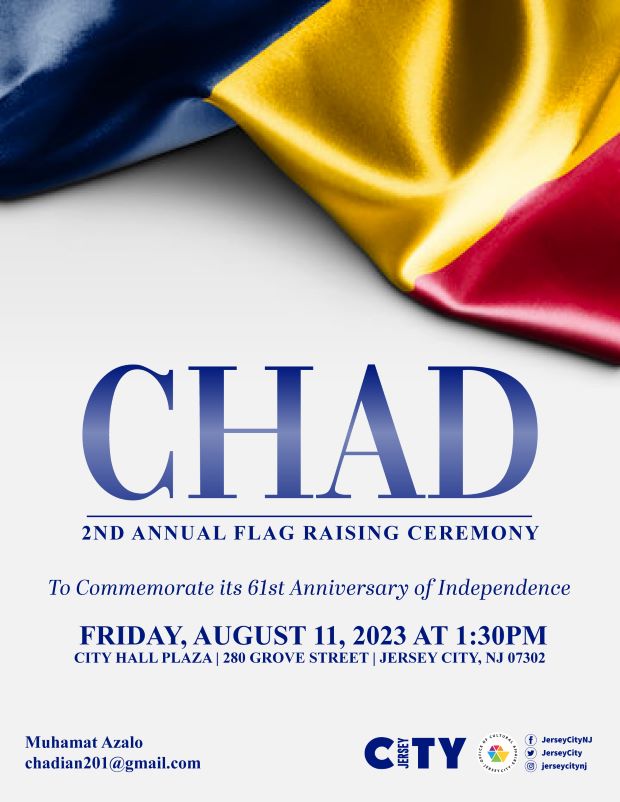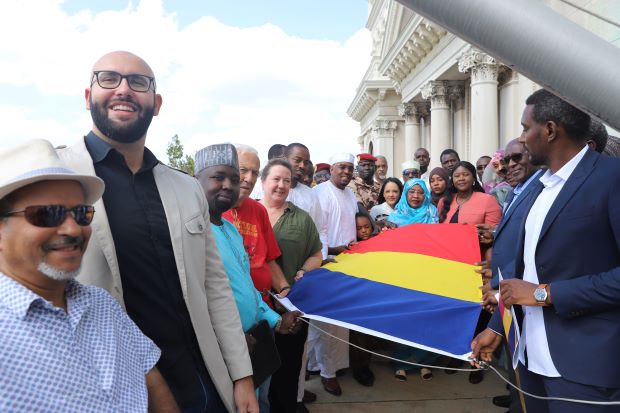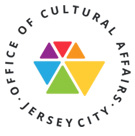Jersey City Menorah Lighting Ceremony 2021
The Menorah Symbolizes The Ideal of Universal Enlightenment. Come together for the Lighting Ceremony at City Hall Tuesday, November 30,2021 at 4:30pm
The Menorah Symbolizes The Ideal of Universal Enlightenment. Come together for the Lighting Ceremony at City Hall Tuesday, November 30,2021 at 4:30pm
The Jersey City Tree Lighting Ceremony Come join in the festivities of the season at The City Hall Annex December 1, 2021 at 5:00pm
Our 25th Annual Toy drive is fast approaching and we can really use your help. Please consider donating a new unwrapped toy for children ages 1-12 yrs. old. With […]
Join us for the opening ceremony on November 20, 1021 Outdoor Festivities includes Food, Live Entertainment, Spoken Word and Holiday Shopping
The Jersey City Office of Cultural Affairs and the Jersey City Mural Arts Program Announces the new COMMUTER GALLERY at Journal Square, 15 PATH Plaza Opening Reception Friday, November 12, […]

The City of Jersey City, Mayor Steven M. Fulop, the Jersey City Municipal Council, the Office of Cultural Affairs were honored to commemorate The Chadian Independence today Friday, August 11, 2023. The Chadian Community of New Jersey has directly contributed to the diversity and positive growth of Jersey City in various fields, including education, entrepreneurship, government as well as all aspects of life throughout the United States and abroad. Today the City of Jersey City and members of the Chadian community commemorate this day August 11, 2023 by proudly displaying the flags of the United States and the Republic of Chad together, high above City Hall in recognition of the socially adopted culture and ethnic diversity of our community of Jersey City.
The Republic of Chad is a landlocked country at the crossroads of North and Central Africa. It is bordered by Libya to the north, Sudan to the east, the Central African Republic to the south, Cameroon to the southwest, Nigeria to the to the southwest (at Lake Chad), and Niger to the west. Chad has a population of 16 million, of which 1.6 million live in the capital and largest city N’Djamena.
Beginning in the 7th millennium BC, human populations moved into the Chadian basin in great numbers. By the end of the 1st millennium AD, a series of states and empires had risen and fallen in Chad’s Sahelian strip, each focused on controlling the trans-Saharan trade routes that passed through the region. France conquered the territory by 1920 and incorporated it as part of French Equatorial Africa. In 1960, Chad obtained independence under the leadership of François Tombalbaye. Resentment towards his policies in the Muslim north culminated in the eruption of a long-lasting civil war in 1965. In 1979 the rebels conquered the capital and put an end to the South’s hegemony. The rebel commanders then fought amongst themselves until Hissène Habré defeated his rivals. The Chadian–Libyan conflict erupted in 1978 by the Libyan invasion which stopped in 1987 with a French military intervention (Operation Épervier). Hissène Habré was overthrown in turn in 1990 by his general Idriss Déby. With French support, a modernization of the Chad National Army was initiated in 1991. From 2003, the Darfur crisis in Sudan spilt over the border and destabilized the nation. While many political parties participated in Chad’s legislature, the National Assembly, power laid firmly in the hands of the Patriotic Salvation Movement during the presidency of Idriss Déby. After President Déby was killed by FACT rebels in April 2021, the Transitional Military Council led by his son Mahamat Déby assumed control of the government and dissolved the Assembly. Chad remains plagued by political violence and recurrent attempted coups d’état.
Today’s flag raising reflects the camaraderie built between the United States and Republic of Chad and our enduring love for freedom, liberty and democracy that today the world is still inspired by.

